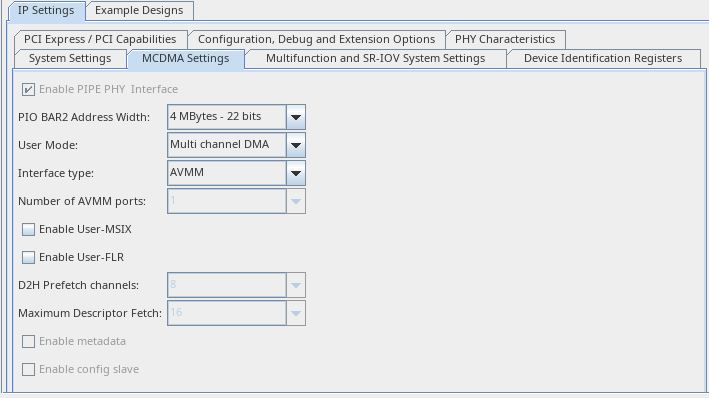Multi Channel DMA Intel® FPGA IP for PCI Express User Guide
A newer version of this document is available. Customers should click here to go to the newest version.
5.1.2. MCDMA Settings

| Parameter | Value | Description |
|---|---|---|
| PIO BAR2 Address Width |
NA 128 Bytes - 7 bits ~ 8 EBytes - 63 bits |
Address width for PIO AVMM port. Default address width is 22 bits |
| User Mode |
Multi channel DMA Bursting Master Bursting Slave BAM+BAS BAM+MCDMA |
This option allows user to configure the mode of operation for MCDMA IP. MCDMA mode has the DMA functionality. BAM and BAS offer Bursting Master and Slave AVMM capabilities without DMA functionality |
| Interface type |
AVMM AVST |
User logic interface type for D2HDM and H2DDM. Default: Avalon-MM Interface |
| Number of ports |
1 4 |
For AVMM Interface type, this is fixed to 1. For AVST interface type, you can select either 1 or 4 ports. |
| Enable User-MSIX |
On / Off |
User MSI-X enables user application to initiate interrupts through MCDMA, this option is available only if the user selects MCDMA mode |
| Enable User-FLR |
On / Off |
User FLR interface allows passing of FLR signals to the user side application |
| D2H Prefetch channels |
8 16 32 64 128 256 |
Sets the D2H Prefetch channels. Applicable to AVST 1 port interface only. In the current release, the D2H Prefetch Channels parameter follows the total number of DMA channels that you select in the IP Parameter Editor up to 256 total channels. When the total number of channels selected is greater than 256, then D2H Prefetch channels are fixed to 64. |
| Maximum Descriptor Fetch |
16 32 64 |
Sets the maximum descriptors that are fetched per D2H prefetch channel. Applicable to AVST 1 port interface only. |
| Enable Metadata |
On / Off |
Enable Metadata. Applicable to AVST 1 port interface only. |
| Enable config slave |
On / Off |
This parameter is not user configurable. This is turned on automatically when a Root Port mode is selected. Not applicable to Endpoint mode. |